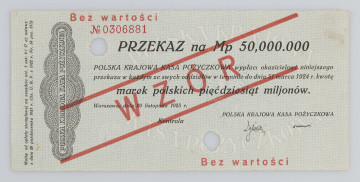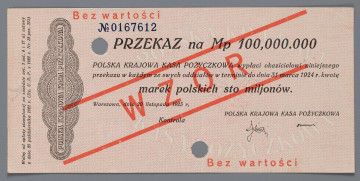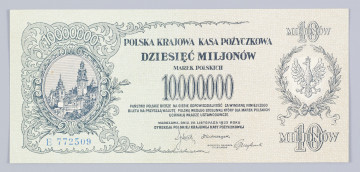
Cheque for 50,000,000 Polish marks - a template
1923
National Museum in Lublin
Part of the collection: Paper money during the Second Polish Republic
The 100 Polish marks (mkp) banknote belongs to the most popular series of Polish paper money of the inter-war period, with face values from ½ to 5000 mkp, issued on 28 August 1919 and 7 February 1920. The banknotes were designed by artists of the Vienna State Printing House in the overloaded style of the Viennese Art Nouveau, whose characteristic features are wavy lines, symmetrically spread floral motifs and pastel colours.
The obverses of these banknotes are decorated with medallions depicting Tadeusz Kościuszko (died 1817) and Queen Jadwiga (died 1399). Mentioning Kościuszko meant cultivating the uprising tradition and shaping the nation in the spirit of social solidarity and patriotic sacrifice. The commander from Racławice was the most frequently depicted person on banknotes of the Second Republic of Poland. His image on the 100 mkp was taken from a painting by Józef Kosiński from 1790. The female figure might have been meant to symbolise Polonia, and thereby the Viennese artist used the image of the queen painted by Jan Matejko to represent the idea of Polish statehood.
The issuer of the mkp was the Polish National Loan Bank (PKKP), established in 1916 on the initiative of the German occupant. After Poland had regained independence, PKKP was adapted together with the mkp to the monetary system of the reborn state. It was a temporary institution whose role was to be taken over by a Bank of Poland after the economic situation stabilised, with the zloty as the national currency. The several-line inscription on its obverse: ‘THE POLISH STATE ASSUMES RESPONSIBILITY FOR THE EXCHANGE OF THE PRESENT TICKET FOR THE FUTURE POLISH CURRENCY ACCORDING TO THE RATIO WHICH FOR POLISH MARKS WILL BE ESTABLISHED BY THE LEGISLATIVE ASSEMBLY’ indicates the temporary nature of the mkp. However, the complex situation of the first years of independence meant that PKKP was a part of the country's economic landscape until spring 1924.
Inflation, which had been rising since autumn 1919, caused the mkp to lose value rapidly. A few days before its introduction (on 5 December 1919), the banknote in question was worth approximately the equivalent of 3 dollars, by the end of 1919 less than 1 dollar, and about 75% of its value by mid-1920.
On 6 December 1919, the ‘Warsaw Courier’ offered officers' shoes for 450-550 mkp.
Tomasz Markiewicz
Author / creator
Dimensions
cały obiekt: height: 173 mm, width: 109 mm
Object type
paper money
Technique
Material
paper
Creation time / dating
Creation / finding place
Owner
The National Museum in Lublin
Identification number
Location / status

1923
National Museum in Lublin

1923
National Museum in Lublin

1923
National Museum in Lublin
DISCOVER this TOPIC
Castle Museum in Łańcut
DISCOVER this PATH
Educational path